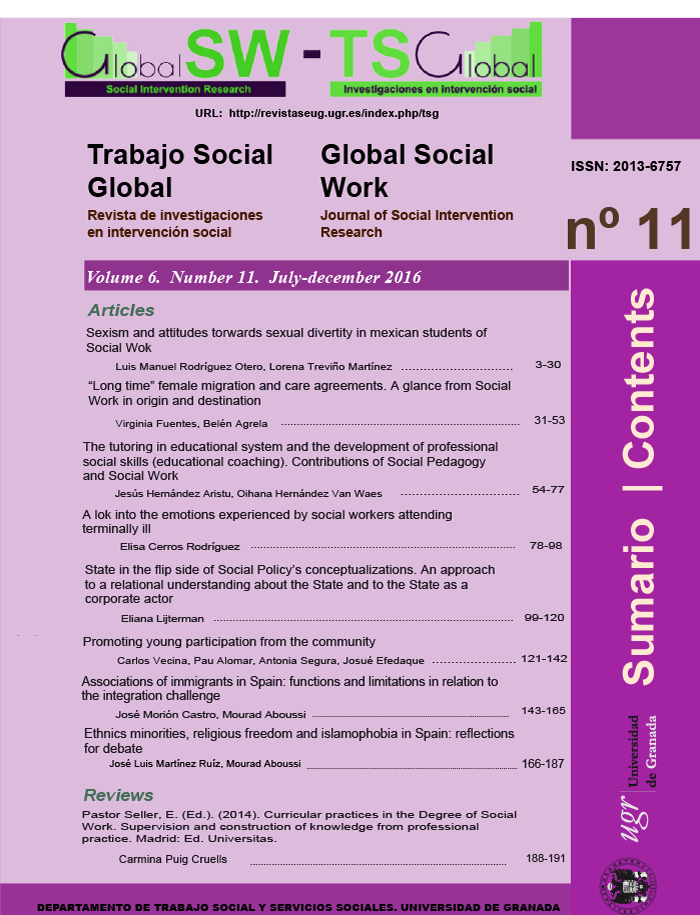A look into the emotions experienced by social workers attending terminally ill
DOI:
https://doi.org/10.30827/tsg-gsw.v6i11.4767Keywords:
Emociones, Desgaste profesional, Trabajadores Sociales, Enfermos terminales, Investigación Cualitativa.Abstract
Since its inception Social Work has faced a common denominator: human suffering in all its manifestations. To address these situations, the social worker requires a set of skills and tools to respond professionally to the subject that requires professional services. But what happens when we talk about the physical and emotional pain experienced by patients in terminal stage? Where the social worker attends and accompanies long way to them, what emotions experienced Social Workers?, suffer from emotional exhaustion? This paper documents the preliminary results of the qualitative research conducted to explore the emotions experienced by social workers involved professionally with terminally ill. It is theoretically supported from cognitive theory of emotions of Richard Lazarus. It was carried out 25 depth interviews to social workers at three public and one private institutions, specialized in care for patients in terminal stage, located in the city of Guadalajara Jalisco, Mexico: the Jalisco Institute of Pain Relief and Palliative Care (PALIA), Specialty Hospital of the Mexican Social Security Institute, the Regional Hospital Valentin Gomez Farias and Shelter Fray Antonio Alcalde AC. Among the main emotions expirienced by social workers include sadness, pride and depression.Downloads
References
Álvarez Gallego, E. y Fernández Ríos, L. (1991). El síndrome de burnout o el desgaste profesional (I): Revisión de estudios. Revista Española de Neuropsiquiatría, 11, 257-265.
Arranz, P., Barreto, P. y Bayés, R. (1997). Soporte emocional desde el equipo interdisciplinario. En L.M. Torres (ed.), Medicina del dolor (pp.389-396). Barcelona: Masson.
Barría, J. (2003). Síndrome de Burnout en Asistentes Sociales del Servicio Nacional de Menores de la Región Metropolitana. PSYKHE, 1, 213-226. Recuperado de: http://www.psykhe.cl/index.php/psykhe/article/viewFile/332/312
Blanco, M. (2006). Estudio cualitativo sobre el síndrome del Burnout en el Trabajo Social. Acciones e investigaciones sociales; No. Extra 1, pp 443 - 463. Recuperado de: http://www10.ujaen.es/sites/default/files/users/factra/Congreso/50.pdf
Facal-Fondo, T. (2012). Prevalencia del Síndrome de Burnout en trabajadores sociales de los servicios sociales comunitarios. Portularia, volumen 12, número 1, 59-69. Recuperado de: http://www.redalyc.org/articulo.oa?id=161024645007
Flórez, J. A. (2002). Signos de alarma para el burnout: una perspectiva integral para el autocontrol (pp.31-38). Actas del XXIV Congreso Nacional Semergen.
Giménez, V. M. (2000). El fenómeno del “burnout” en las profesiones de ayuda. Estudio experimental de la situación en centros sociales municipales de la ciudad de Alicante. Revista Trabajo Social, 159, 65-102
Gunaratnam, Y, Lewis, G, (2001). Racialising emotional labour and emotionalizing racialised labour: anger, fear and shame in social welfare, Journal of Social Work Practice: Psychotherapeutic Approaches in Health, Welfare and the Community, 15, 2, 131- 148
Hombrados-Mendieta I y Cosano-Rivas, F. (2013). Burnout, workplace support, job satisfaction and life satisfaction among social workers in Spain: A structural equation model. International Social Work, 2013, Vol.56(2), pp.228-246 SAGE Publications.
Lázaro, S. (2004). El desgaste profesional (síndrome de Burnout) en los Trabajadores Sociales, Portularia, vol.4, 499-506. http://rabida.uhu.es/dspace/bitstream/handle/10272/191/b15139372.pdf?sequence=1
Lazarus, R. (1999). Estrés y Emoción. Manejo e implicaciones en nuestra salud. España: Editorial Desclée de Brouwer, S.A.
_________ (2000). Pasión y Razón. La comprensión de nuestras emociones. Barcelona: Editorial Paidós.
Lloyd, C. y King, R. (2004). A survey of burnout among Australian mental health occupational therapists and social workers. Social Psychiatry and Psychiatric Epidemiology. September 2004, Vol. 39, Issue 9, pp. 752 – 757. Recuperado de: http://connection.ebscohost.com/c/articles/14593271/survey-burnout-among-australian-mental-health-occupational-therapists-social-workers
Morales, G. ; Pérez, J. C. y Menares, M. A. (2003). Procesos emociones de cuidado y riesgo en profesionales que trabajan con el sufrimiento humano. Revista de Psicología de la Universidad de Chile, Vol. XII, No. 1. pp 9-25
Ortega, C, y López, F. (2004). El bournout o síndrome de estar quemado en los profesionales sanitarios: revisión y perspectivas. International Journal and Health Psychology. Vol. 4 No. 1, pp.137 -160. Recuperado de: http://www.aepc.es/ijchp/articulos_pdf/ijchp-100.pdf
Sandín, B; Chorot, P. (2003).Cuestionario de afrontamiento del estrés (CAE): Desarrollo y validación preliminar. Revista de Psicopatología y Psicología Clínica, vol. 8 (1), 39-54
Smullens, S. (2015). Burnout and Self-Care in Social Work: A Guidebook for students and those in Menthal Health and related professions. NASW Press.
Downloads
Published
How to Cite
Issue
Section
License
Authors publishing in this journal agree to the following terms:
- Authors retain their copyright. They guarantee to this journal the right to a first publication of the work submitted to initiate the editorial process.
- Authors know that their work is published under a Creative Commons License which allows others to share it, with a recognition of the work's authorship and its initial publication in this journal.
- Authors share with Global Social Work explotation rights of the work that has been published in this journal, authorizing the execution of a free reproduction, distribution and public communication. Authors know that their work will be stored on servers and reproduced in digital format for inclusion in institutional repositories and databases that will facilitates free access to the full text of the work.
- Authors may distribute the version of the work published in this journal (for example, to an institutional repository or publish it in a book), with the explicit acknowledgment of its initial publication in this journal.
Copyright on the texts published in Trabajo Social Global -Global Social Work, as well as editorial policy of the journal refering to self-file and deposit in institutional or thematic repositories, are identified in the database





















